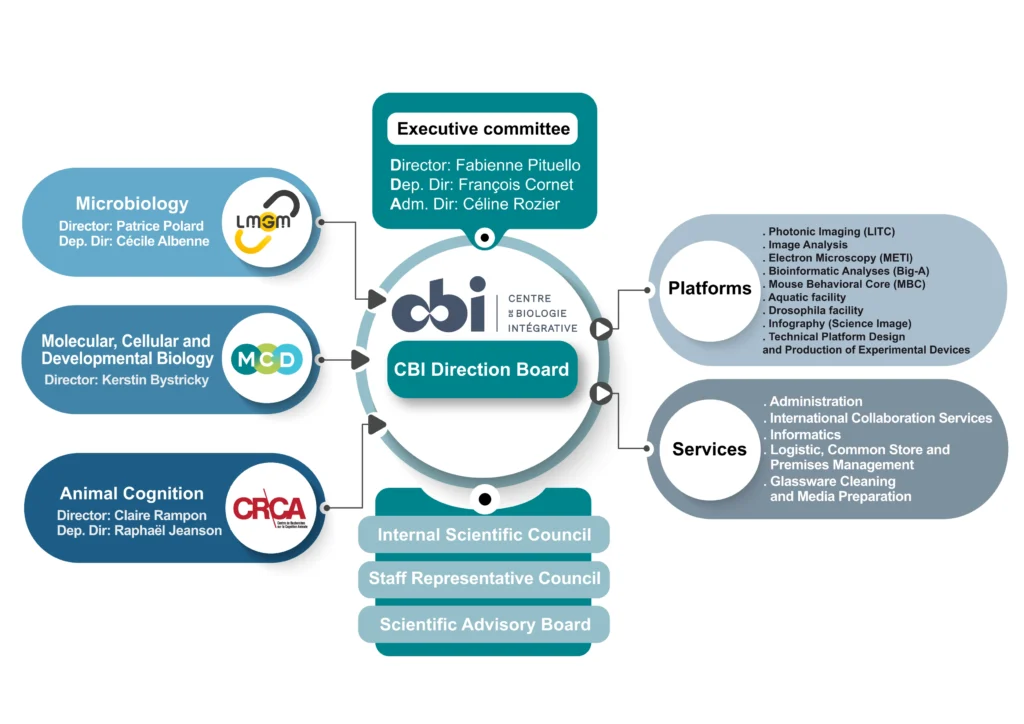Pour cela, le CBI offre à ses équipes de recherche un environnement de pointe grâce à ses services de soutien à la recherche, des infrastructures dédiées à ses nombreux organismes modèles et ses plateformes technologiques qui comportent et développent des équipements innovants, notamment en imagerie du vivant et en microscopie électronique, en analyse d’images, bio-informatique ou encore en analyse du comportement. Les équipes du CBI développent des approches multidisciplinaires, multi-échelles – des molécules isolées aux organismes entiers et aux sociétés animales – et utilisent de nombreux organismes modèles, des bactéries à l’homme. Ces recherches sont en lien avec les enjeux sociétaux comme la santé et le bien-être, la médecine du futur ou encore l’intelligence artificielle, définis par nos tutelles, la région Occitanie et plus largement l’Europe.
Le CBI a été créé en 2016 comme une Fédération de Recherche sous la tutelle du Centre National de la Recherche Scientifique (CNRS) et de l’Université de Toulouse (UT). Aujourd’hui, le CBI rassemble plus de 400 personnes, réparties dans ses services de soutien, ses plateformes et environ 40 équipes réparties dans trois unités de recherche : Microbiologie (LMGM) Biologie Moléculaire, Cellulaire et du Développement (MCD) et Cognition Animale (CRCA). Ses équipes, plateformes et services sont composés de chercheu.r.se.s, d’enseignant.e.s-chercheu.r.se.s, de doctorant.e.s et post-doctorant.e.s, de personnels administratifs et techniques du CNRS, mais aussi de l’Université et de l’INSERM qui en font l’un des plus importants pôles de recherche scientifique en France.
Également centre de formation reconnue, le CBI accueille chaque année de nombreux étudiant.es et stagiaires. Il contribue notamment à la formation par la recherche de masters, doctorant.e.s et chercheu.r.se.s post-doctoraux. Il offre un programme de « mentoring » pour guider et accompagner ces jeunes collègues afin qu’ils.elles atteignent leur objectif professionnel. Le CBI joue également un rôle majeur dans l’enseignement, de la licence au master, avec près de 50 professeur.e.s et maitres.ses de conférences qui enseignent dans de nombreux domaines à l’Université de Toulouse. Les équipes du CBI sont rattachées aux écoles doctorales Biologie, Santé, Biotechnologies (BSB), Sciences Ecologiques, Vétérinaires, Agronomiques et Bioingénieries (SEVAB) et aux École Universitaire de Recherche (EUR) Cancer, Aging and Rejuvenation (CARE) et University of Toulouse graduate school of Emerging Infectious Diseases (UNITEID).
Le CBI bénéficie d’un environnement scientifique hautement collaboratif et innovant grâce à sa situation sur le campus principal de l’Université de Toulouse qui offre des formations et des laboratoires de pointe dans les domaines des sciences, de la santé, de l’ingénierie, de la technologie et des sports. Les approches interdisciplinaires avec la physique, les mathématiques, les nanotechnologies, l’informatique et la chimie sont ainsi favorisées et développées. L’Université de Toulouse comprend également deux hôpitaux universitaires. Le CBI est membre du réseau Biologie et Biotechnologie pour la Santé (sFR B2S), dédié à la diffusion des connaissances et des informations de manière coordonnée entre les différents centres de recherche dans le domaine de la recherche en biologie et santé.
